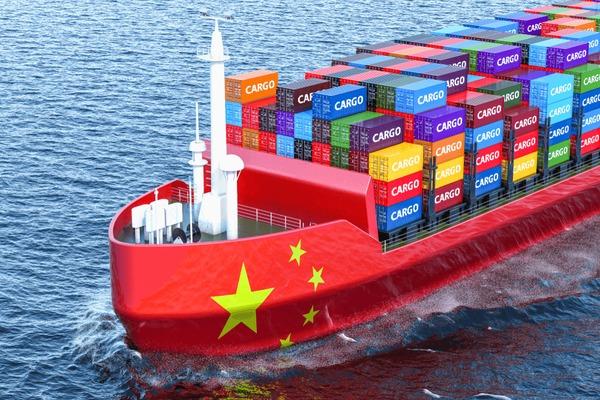A Chinese cargo ship has arrived at a port in Russian-occupied Crimea, marking a notable development amid ongoing geopolitical tensions in the region. The vessel’s docking underscores growing economic interactions between China and the authorities controlling the peninsula, which remains a focal point of international dispute following Russia’s annexation in 2014. This event raises questions about the implications for international trade routes and the enforcement of sanctions imposed on Crimea.
Chinese Cargo Ship Arrival Signals Growing Economic Ties Amid Crimea Controversy
The recent docking of a Chinese cargo vessel at a port in Crimea marks a significant development in Sino-Russian commercial relations, despite ongoing international disputes surrounding the peninsula’s status. The shipment, carrying a diverse mix of industrial goods and consumer electronics, suggests an expanding economic linkage that challenges existing sanctions and geopolitical pressures. Observers note that such ventures not only bolster Russia’s economic foothold in the region but also signal China’s increasing willingness to engage in contested territories for strategic trade benefits.
Key details from the recent docking:
- Large-scale delivery involving over 500 containers
- Consignment includes machinery parts, electronics, and textiles
- Facilitated under new trade agreements targeting regional infrastructure
| Item Category | Quantity | Purpose |
|---|---|---|
| Industrial Machinery | 200 units | Infrastructure Development |
| Consumer Electronics | 150 units | Retail Distribution |
| Textiles | 170 containers | Local Manufacturing |
Implications for International Maritime Law and Regional Security Dynamics
The docking of a Chinese cargo ship in Russian-occupied Crimea challenges established norms under international maritime law, igniting debates over the legal status of vessels engaging with disputed territories. According to the United Nations Convention on the Law of the Sea (UNCLOS), ports under occupation or annexation without broad international recognition raise contentious questions about sovereignty and legitimate jurisdiction. This incident may set a precedent for neutral countries or commercial actors potentially enabling the normalization of maritime routes in politically sensitive zones, complicating enforcement efforts by states opposed to Moscow’s claim over Crimea.
- Possible violations: breach of sanctions and disputed territorial waters.
- Implications: challenge to freedom of navigation principles.
- Risks: increased geopolitical tension in the Black Sea region.
On a broader scale, this development marks a potential shift in regional security dynamics. The Black Sea, already a hotspot for NATO-Russia rivalry, may now witness enhanced cooperation between China and Russia in spheres traditionally dominated by Western maritime powers. Beijing’s implicit endorsement through commercial activity signals an emerging pattern of strategic alignment, which could exacerbate security dilemmas and prompt a recalibration of naval postures by neighboring states. The event underscores the necessity for multilateral dialogue and updated frameworks reflecting the evolving maritime realities in contested zones.
| Aspect | Potential Impact |
|---|---|
| Maritime Law Enforcement | Complicated by new diplomatic alignments |
| Regional Security | Elevated tensions; increased military presence |
| Economic Relations | Potential growth in China-Russia trade despite sanctions |
| International Norms | Erosion of established maritime legal standards |
Summary: The docking event highlights a critical inflection point in maritime politics, where commercial decisions intersect with geopolitical contestation. It raises urgent questions about enforcement of international law, potential shifts in regional power balances, and the role of global actors in upholding or undermining the rule-based order in contested maritime domains.
If you want me to generate any further analysis, a briefing document, or assistance with another format, just let me know!
Recommendations for Diplomatic Engagement and Strengthening Sanctions Enforcement
To address complexities arising from increased maritime activity in Russian-occupied Crimea, a nuanced approach to diplomatic engagement is essential. Priority should be given to multilateral dialogue involving key actors across Europe, the United States, and Asia to reaffirm the consensus on Crimea’s international status and to coordinate responses. Diplomacy must leverage existing international frameworks while exploring new confidence-building measures that foster transparency in shipping routes and cargo verification, ensuring broader consensus and compliance.
Strengthening sanctions enforcement demands a robust, integrated system combining intelligence-sharing, technological monitoring, and legal cooperation. Key recommendations include:
- Enhanced satellite and AIS (Automatic Identification System) monitoring to track suspicious vessel movements.
- Coordinated customs inspections and port controls among allied states.
- Establishing a centralized sanctions compliance task force to investigate infractions and impose timely penalties.
- Improved transparency through public reporting mechanisms on sanction violations and enforcement actions.
| Measure | Expected Impact |
|---|---|
| Satellite Imaging & AIS Tracking | Real-time vessel route visibility |
| Joint Customs Operations | Reduced illicit cargo transshipment |
| Centralized Enforcement Task Force | Faster investigation and sanction imposition |
| Public Reporting Mechanisms | Increased accountability and deterrence through transparency |




